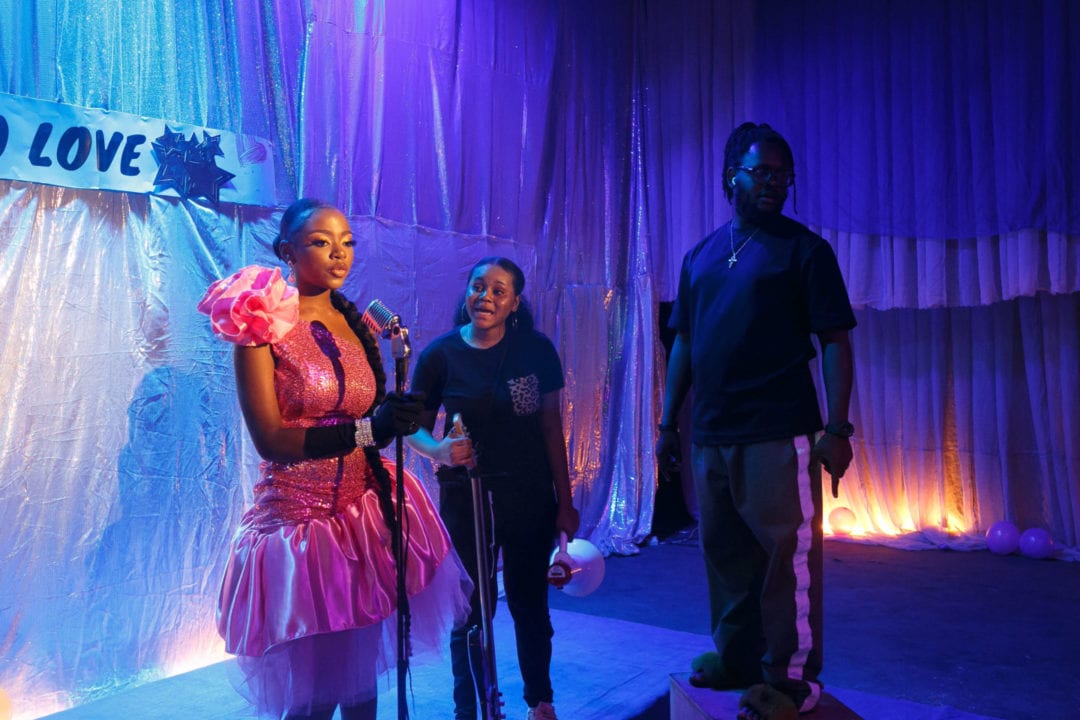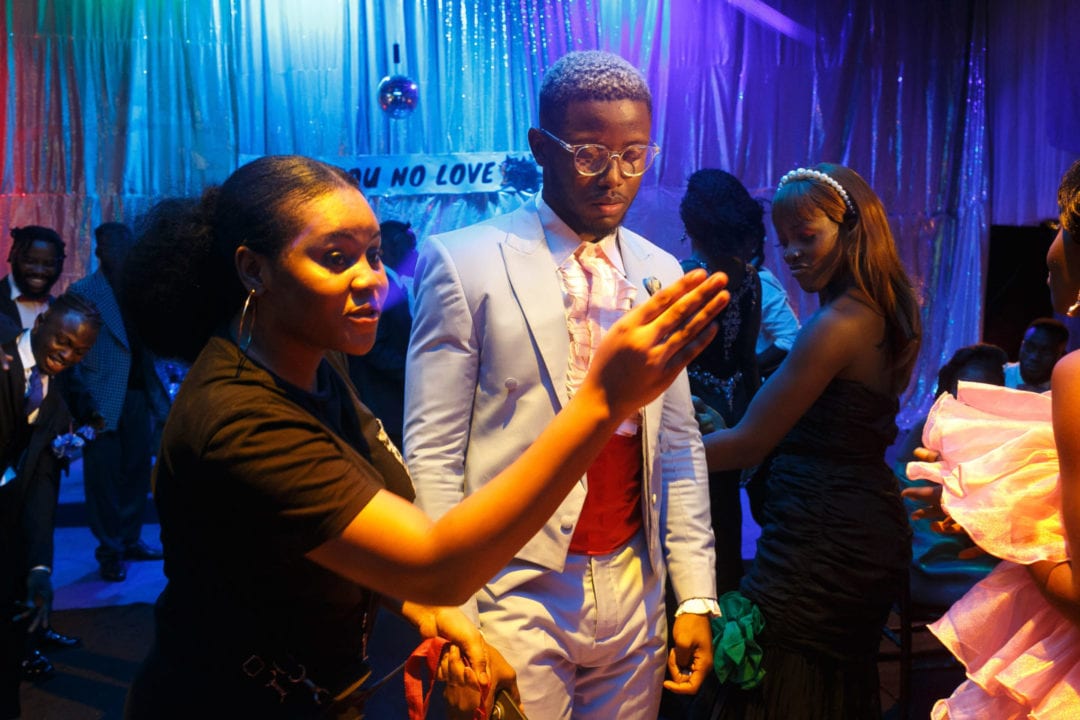Latest Music:
Director Pink is the 21-year-old Female Cinematographer Changing the Industry One Music Video After Another
It is said that representation is important so people see themselves in others and understand that they can aspire to be more. It's a leading argument among female empowerment circles but at 21 years of age, Praise Barnaba, or Director Pink as the watermark to visuals she creates bare, not only believes that but walks the talk.
Moved by visionary eyes sharper than the world would expect on one so young, the final year student of Economics from Unilag has even while the pandemic rages, gone on to achieve for herself an A1 Certification as a music video director with an all-female run production for the visuals to the remix of Chike's If You No Love featuring Mayorkun. She later scored a brace by being re-contracted by Chike's manager to direct the video for Simi’s Running with Chike, a video that now has close to 2 million views on YouTube alone.

For Notjustok's women in history month, we sit down with 4 female key players in Nigeria’s male-dominated music industry to celebrate them and examine the work that needs to be done to eke out equality. Here, I speak to Director Pink on her work as a female cinematographer, the journey to gaining her impressive portfolio at such a young age. And how she is with her presence and all-female run production company, Pinkline Films, creating space for other women who nurse dreams of becoming a known name in the music video sector that complements Nigeria's jet-set music industry.
Happy women's history month to you. So your career path is quite unique for a Nigerian woman living in Nigeria. Can you tell us what you do?
My name is Praise Barnaba also known as Director Pink, I'm a film director and cinematographer, film editor, I became 21 November last year and I own a production company called Pinkline Films.
So when did you decide to set out on this path and how has it been since then?
It was when I was 15/16, that's when I decided to go into shooting videos. I started from church. You know when they're insistent that you join a particular team or the other? “You don't want to be an usher, be a chorister,” all those types of things.
But I didn't want to be that, I couldn't sing and ushering, I can't start standing. Something just drove me to the video team in church, they were just guys. So I went to meet the head and I was like, I want to join this team. He looked at me and was like “Ahan, you want to join the video team? I said yes and he exclaimed and asked “How would you be carrying the camera? It's heavy.”
And I told him not to worry that I was going to try and do my best.
So he started putting me through the ropes, he taught me how to use different basic cameras and editing. So I started editing at the age of 15 so I've been in this for 6 years. There was a time when I took a break but it wasn't for so long.
ALSO READ: International Women's Day: Celebrating 10 Women Behind the Music We Love
And when did you decide that you were going to make it your career?
That should be 2018 because in 2016, I was still doing it for the Lord. In 2018, I lost my mom who was the breadwinner of the house. But before that, while she was sick, I was already a graphics designer and I was into still and motion graphics. So when my mom died, I was in 200L and nobody was looking at my side anymore, they all felt I was a big girl so I had to find my way. I didn't even have anything then, I didn't have a laptop. Even when I was editing in 2016, I was using church laptops. So I started designing graphics with my phone but I wouldn't let them know I was using my phone.
Later I started to partner with some printing companies. So I'd print for them and I'd take my cut. But then, that wasn't the main hustle I wanted to go in for. I just had my phone so I just had to make the best use of what I had. Eventually, I was able to save up money, 1k here, another one 1k there, and then I got my first personal laptop, it was a Zed at eighty thousand.
But unfortunately, the laptop couldn't edit videos because of the RAM space so I only had the opportunity to install Photoshop so I just kept on designing and I was no longer that girl designing on my phone. It was more professional. But I still made up my mind then that I must get another laptop because I didn't want to design, I wanted to edit videos. So from there, I got another laptop and I started working on motion graphics design.
Then I did animated ad promos so I started going into videos gradually. It was like a process where I started up all over again because when I used to be in church, I used to go for wedding programmes with my head of video team. So I'd shoot and then he'd make me edit and pay me a cut. But I was in school and that was quite far away from church.
With my second laptop, I started video editing and I was growing. There's this guy, Edem Victor, he shoots skits for Instagram comedians, Mr Macaroni, Mc Lively, and majorly Oluwadollarz, I'd be like, I just want to come on set. He was shooting on a small scale but I just wanted to see how other things are done basically. I already knew how to do what he was doing but I just wanted to be in that space. From there, I started going to other sets of skit production but that wasn't what I wanted to do.
I was still trying to figure out what exactly I wanted to do, like ‘Am I going into film or documentaries?’
I began to concentrate more on music videos cause I started to get attracted to them. I just really liked it and then I decided to see how it was done.
Apart from going on set, I always had my tutorials online, 90% of what I know now is what I checked up online, YouTube, Udemy, all those platforms.
So I started looking around on Instagram, asking some directors-- some that followed me, we thank God, the ones that didn't follow me, we still thank God-- to come on set. Some were open to the idea and invited me on set. There was this guy, The Alien, he was the one I got the most experience from. I was on his set seeing how things were done till I finally got the courage to shoot my personal music video. I was shooting other things before then but shooting my music video but I wanted to put priority on it. I shot this video like January last year-- Philomena by Marxii.
When I shot that video I felt fulfilled, like ‘wow I did this.’ It was imperfect but I did what I could and used what I had. And since then I've been growing and now we're here.
Through all of this, did you see any female cinematographers that inspired you, or what would you say gave you the urge to become one?
It was Kemi Adetiba. She's someone that'll put out a movie and you'll just have goosebumps. So I was so wowed and she's actually the one that inspired me to go farther. I really wanted to know how directing works because we really don't have female cinematographers, I don't think we even have a DOP-- the person that operates high-end cameras, so at times I do that.
So is it safe to say you're our first DOP in Nigeria?
I'm not saying that o. There should be but mainly they are female directors but normally, in a professional space, there's supposed to be a DOP and a director.
We don't even have a colourist. We have so many empty spaces where we still need ladies.
At the beginning stages, were you scared and how did you overcome that fear?
I wasn't scared, I was hungry for achievements. I was so hungry, I did a lot of pro bono then. They'll tell me ‘Come, bring your camera and shoot, we'll settle you, you're my friend.’
But I still did that with smiles on my face because I wanted to explore. So even when I wanted to shoot, I was still exploring my creativity. Iif you pay me or you don't, I still achieved a lot because I tried my best to put out my creativity. So, I won't say I was scared. I wasn't. But then when I started doing bigger projects, I started to get scared a day to my shoots. Because it's very hard as a director, everyone's following your vision. So it's like you have so many blind people following you and you're the only one with the eyes and they're just following what you see and your every instruction-- if you say ‘turn left’, they turn left, and so on. So it's always very hard because what if at the end of the day, what you had in your head doesn't just come out well?
It's not like I'm a writer working on something that you can read and visualise in your head, the mental picture I have would be different from the mental picture you'll have when you read that same book, but then, if you're watching a video, we're both watching the same thing and we're both downloading that same mental picture that we're seeing into our head. So you can't do any mago mago inside, if they don't like it, they don't like it. So imagine you now having that mental picture and you're trying to bring it to life and everyone is going to see that. So it's always very hard because what if at the end of the day, it doesn't come out? So that's what makes me get scared.
ALSO READ: From Odunsi to Tay Iwar, Kimani Moore is the Alte Talent Manager Extraordinaire to Watch

Director Pink working as DOP on set for a music video
The music industry as it is is very male-dominated and the music video sector is even more so. Do you ever face any sexist challenges and how do you navigate this?
A lot o. Some artistes won't even call you female director but girl director and then they doubt what you can do. But I don't care, if they want to shoot with me and I give you something and you're ready, fine, welcome to Pinkline. If you don't want to shoot with me, fine and good. But I know that one day, you're still going to come back.
So it’s quite tasking cause you’re on a whole lot of doubt. That is why if a guy is putting in 100% in his video, as a female director, I have to put in 200% because that is the only way I can get noticed and increase the confidence that people have in me. I can’t just say as a lady, I should just sit down relax and do nonsense. I have to make my visuals look as appealing as possible. So most times I get attached to my works because I want it to come out well, not just because, but because I want to prove a point that women can actually do these things and be way better because all these works are going to be out there and people are going to be on the lookout for you. So if you’re putting out nonsense, people are going to be like, “Normal now, na woman.” But if you’re putting out good stuff, they’re going to be like “Wow! Ahan, it’s a woman?!”
You work with an all-female crew, Pinkline Films, can you tell us about that?
It’s from the colour pink, you know it’s generally common to girls in terms of colour choice that’s why I picked pink. And then the ‘line’ in ‘Pinkline’ that’s a line of ladies that are in film, so that’s what brought about ‘Pinkline Films.’
It’s still getting there trying to get ladies to be in this part of the industry, that’s why no matter what I do, I try as much as possible to work with a female editor and producer. The rest are going to probably start being trained so that they can actually put out things because even though I want to have an all-female crew, I can’t just have anybody do anything. Even if you’re a girl, I need to be impressed by what you do before I can ask you to be on my work because, at the end of the day, I’ll definitely use a guy whose works impresses me.

Director Pink with Diane Russet for the video of 'If You No Love'
There are no female colourists, no VFX artist in the music industry but in tech, only one female gaffer-- a lady that controls lights. It’s that bad, so it is going to be very very hard to have a complete all-female team, the only way it can get there is bringing in more female cinematographers that are probably just even starting and trying to teach them the ropes and allow them to go training with guys that are really good at it. But I feel like most ladies just want to be directors, and the funny thing is there are other sectors to dominate, it’s not just about being a female director. The moment I knew I wanted to be a director, I knew there was no director in music, I could only see some female directors but they don’t always get so many gigs so they don’t put out a lot of work. But then, it’s not compared to other aspects-- being a gaffer, colourist, VFX artist, D.O.P, so we need to have people there and it’s always very hard because most of them want to be directors.

Director Pink with Chike on the set for his 'If You No Love'
You mentioned training women to fill these roles, is that something currently going on in your company?
Yes, we have some ladies and we have more coming in. Then in terms of training, it’s still a bit by bit process because we need to get more male allies to partner up and empower women in filmmaking. That’s still in the works so it’s not going to be ready till like July, with series of training and females in other aspects of filmmaking.
Would you say your name ‘Director Pink’ and the fact that you own an all-female-run film company is political?
I see it more as a form of encouragement to women, not like we’re taking over the space o. The sky is big enough for everyone but then, let’s have more ladies in the industry let’s do this, and let’s kill it!
You directed the video to the remix for Chike’s If You No Love, with Mayorkun, what was that experience like?
I did that under Clarence Peters, and the fact that I was actually going to work with Clarence Peters, I was like ‘Okay, just shoot me.’ Then trying to create and working with an all-female crew was like the best thing that ever happened because they were so easygoing. You know most times, ladies are hard to work with but my team, everybody was ready to explore ideas and bringing in their ideas. Clarence was like “Okay, I’m going to leave you guys, do what you want, I’m not putting my mouth.” And we did that and it came out well, everyone went ‘Wow, this is really nice, created by just girls’ and it was an amazing experience.
ALSO READ: Happy Mother's Day! Celebrate Your Mom With These Beautiful Nigerian Songs
How did you link up with Chike?
For If You No Love, it was through Clarence Peters, he was like I like this song, I think we’re going to bring female energy into it and have just ladies on board and he contacted me. I literally screamed when that happened. From there, Chike’s manager contacted me afterwards for Running.
So what was it like working with Simi who’s a strong female player in the industry while directing her Running collab with Chike?
Immediately I walked into the door to the dressing room, she just went “Oh wow, it’s a lady!” (You know her voice now) She was just so happy, ‘like this is the best director I’ve worked with.’ Ans she was glad it was a lady. This is because she brought her child and she was supposed to leave early. She said she was shooting for 2 hours because she had to take her child home, it was going to be pretty late and all that. I assured her and we shot for just those two hours or less. You know how production is now, when they tell you two hours, just multiply it by two. So when she came, she did her makeup, everything, but then shooting time was just two hours. So there was no rush period because I kept my word so she was really amazed and speaks highly of it, I’ve not heard the last of it. Even Chike’s manager is always so glad.
Is it safe to say that after you directed the video for If You No Love, Chike was so wowed that he decided to bring you onboard to create the video for Running?
You can say that cause he really liked the video for If You No Love, and went, “Let’s do another one.” Before that, he’ll call me at midnight and tell me “This video is important to me, let it come out well.”
If You No Love and Running combined have almost 4 million views on YouTube, how does it feel to know you’re the director behind those videos?
It’s nice. And I just know I’m creating that space because on YouTube you can count in millions not to talk of TV. It makes me feel like my work is going that far. And when I got reviews especially from Running, everyone was like “Oh my God, I didn’t expect that end, why did he die?”
Was the storyline your idea?
Yes. They just gave me a synopsis and told me to expand the story and just let him run to something. So I did that and created a storyline in less than 3 hours-- in terms of mental execution, creating a treatment, and all that, cause it was quite urgent and I sent it to them and they told me they liked it and we should work with it.
So the part where the guy was going to die, I wanted it to be emotional as possible, I didn’t want it to be predictable, I don’t like that, I like when people’s minds are taken on a journey and lead you back to the video and make you tell people about it. Because at the end of the day, it’s not just about you the director, it’s also about your clients. So they need this audience. They need the buzz, so you have to create something that’ll lead them back to the video so they’ll watch it and watch it all over again and not get tired.
The theme for this year’s International Women’s Day was Choose to Challenge, the day is over but lives on in women like you who challenge the male-dominated narrative in the industry by creating space for other women, what would you say to other women trying to do same?
Don’t look at the men, just look at it like we’re all human beings trying to hustle. And whatever you’re doing, always make sure that if a guy is putting in more hard work than any other guy by putting in 1000% because that’s the only way you can be noticed and get people to give you jobs.
What next should we be expecting from Director Pink and Pinkline Films?
I have another video I shot for Chike and there are loads of videos that are yet to be released, but I’m not their manager, so just be waiting.
The post Director Pink is the 21-year-old Female Cinematographer Changing the Industry One Music Video After Another appeared first on Most Trusted Voice in Music & Afrobeats from Nigeria & Africa | Notjustok.
Thanks for Reading The LATEST UPDATE:
Director Pink is the 21-year-old Female Cinematographer Changing the Industry One Music Video After Another
SHARE WITH FRIENDS

